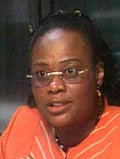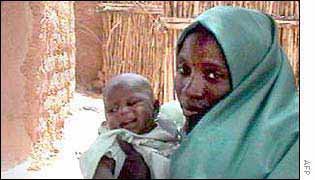Dr. Dora Nkem Akunyili And Women In Nigeria
 DR.DORA NKEM AKUNYILI
DR.DORA NKEM AKUNYILIThe Nigerian Times will honour Dr. Dora Nkem Akunyili as the African Woman of the Year 2005.
This African-Nigerian Ibo Amazon is a worthy role model in honest and upright leadership for not only women in Africa, but also for women all over the world. Dr. Dora Nkem Akunyili can become the President of Nigeria and I pray to the Almighty God to grant my wish to give us such an honourable woman to lead Nigeria.
Dr. Dora Nkem Akunyili - (Nigeria)
Director General of Nigeria's National Agency for Food and Drug Administration and Control (NAFDAC) and a pharmacologist by training, Dr Akunyili has defied death threats while tackling corrupt practices in the manufacturing, import and export of drugs, cosmetics and food products. Since taking up her position in April 2001, Dr Akunyili has earned nationwide respect for her persistence in prosecuting illegal drug traders and in imposing strict standards on multinational companies. In particular, she has pursued manufacturers and importers of counterfeit drugs, deemed to be a leading cause of deaths by stroke and heart failure in Nigeria. Counterfeit drugs worth an estimated US$16 million have been confiscated and destroyed by Dr Akunyili and her staff, in the process saving the lives of thousands of innocent Nigerians.
 AMINA LAWAL WHO WAS NEARLY STONED TO DEATH IN NOTHERN NIGERIA.
AMINA LAWAL WHO WAS NEARLY STONED TO DEATH IN NOTHERN NIGERIA.Nigerian women can lead Nigeria to become a better and greater nation in the leadership of Africa among the comity of nations.
More on Women In Nigeria
The lives of middle class Nigerian women differ greatly from those of most western women. Since pre-colonial days women retained certain economic opportunities within the social system. In fact, before the middle of the twentieth century, Nigerian women traditionally played a more significant role in society than did western women. Traditional or tribal society in Nigeria expected women to be significant wage earners in the family. They labored in farming, fishing, herding, and commerce (for instance, pottery, cloth-making, and craft work) alongside Nigerian men. In fact, women traditionally had the right to profit from their work, although the money usually served as a contribution to the family income. This economic freedom was much different from many western societies, where women had to fight for the right to work. These traditions still survive in modern Nigeria
However, Nigerian men do not value the economic contributions of their wives. They do not view the woman's job and household work as especially taxing. For the most part, Nigerian men consistently take their wives for granted. Moreover, even with economic opportunities, Nigerian women lack certain rights. As a rule, men do not have any legal responsibility for their offspring, and they often abandon women, expecting them to carry the financial burden of the family.
Marriage
The Nigerian institution of marriage is unconventional by western standards. The traditional and Islamic systems of polygamy flourish within every social class. Women expect very little from men in terms of companionship, personal care, and fidelity. Their relationships exist without the emotional elements.
Polygamy is a crucial component of many women's lives. Women depend on the other wives of their husbands. The younger co-wives take on many of the household and financial responsibilities. As women get older they have the comfort of knowing that the burden of their marriage does not fall solely on their shoulders.
A woman's postion in society changes vastly once they marry since she becomes a possession, with relatively no rights in her husband's family. In fact, the husband's mother and sisters have much more of an influence over him than his own wife. The wife resents this lack of control or even respect within their marriage.
The Nigerian system of inheritance reflects the lack of male responsibility to his wife and children. If a husband dies, the woman usually receives nothing, although the law entitles her to a share. If she has no children, the treatment is worse. Since property can only pass between the same sexes, women can never inherit from their fathers.
Within marriage, women have an obligation to have children. Traditionally, society blames the woman for a marriage without children. Society not only condemns women who cannot have children, but unmarried and divorced women as well.
In recent years, the support of the co-wives has diminished. Modern developments of mandatory education, urbanization, and capitalism are changing the Nigerian society. Since 1960, educational opportunities have expanded for women. Slowly men are beginning to see the value of higher education for their wives. Now, more often than not, they send their daughters to school for an education.
Abortion
Abortion is still illegal in Nigeria. In fact, women make up the strongest opposition to it. Surprisingly, men seem to be much more willing to accept the idea than most middle class women.
Political Roles of Women
Today women play a minimal role in politics, although the 1979 Constitution guaranteed their rights. In pre-colonial Nigeria, women had a much larger position in politics. Unfortunately, the western influences restricted women's participation. Now, women have relatively little opportunity to become involved. The political parties do not look favorably upon female candidates.
As western values gained influence in colonial Nigeria, women lost some of their traditional rights. For the most part, women in Nigeria have not attempted to rise in their maleidominated society and patriarchy continues to thrive. But as time passes, women are beginning to demand some equality. Perhaps they will be able to reconcile the rights of the past with the freedoms of a modern age
Comments
This is ceasing to be commonplace in modern families. As traditional institutions become weakened so does the power of the extended family.
You fail to mention that women empowerment in Nigeria differs greatly across the country. Women from the Islamic north can hardly be described as empowered (there are exceptional cases of course) as their husbands dictate every single detail of family life. In the Christian/traditionalist Middle Region and South, women are much more empowered.
The differences were well addressed in the paper on "Women in Nigeria." Even my pictorial reference to Amina Lawal in contrast to Dr. Dora Akunyili is meant to show the differences in the treatment of Nigerian women in the Islamic North and Christian South.